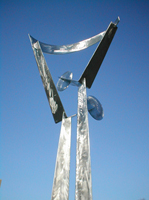
Bryn Mawr College

 |
Center Bryn Mawr College | 
|
September 25
Ted Wong
"Metaphor, Metonymy and the Two Sciences"
Following the ideas of Roman Jakobson , as mediated by Michelle Mancini, of the BMC Dean's office, and Jane Hedley of the English Department (who wrote Power in Verse : Metaphor and Metonymy in the Renaissance Lyric [University Park : Pennsylvania State University Press, 1988]), Ted explained that langauge operates through a combination of similarity and contiguity relations. Metaphor talks about a concept by describing something similar to it; metynomy does the same by talking about what is continguous to it. (Synecdoche is a subset of the latter, in which a particular part of the object is described. An example of a metonymy for "sailer" would be "salt," and of a synecdoche, "hands".) Working with people who had aphasia (who couldn't read certain words), Jakobson distinguished continguity from similarity disorders, and postulated that the different language behaviors were the result of different cognitive processes. Jane Hedley described the poetry of Adrienne Rich, which describes the "touch" of women, as exemplifying contiguous understanding--as opposed to the masculine sonnet tradition Rich revised, in which the metaphoric work of "sight" was extensively employed.
Ted explained that scientific theorists come up with metaphors, or models, which say something about the natural world by pointing to a set of equations. Criticisms of a model will ask whether it is really like nature, actually similar or discontinuous to the real world. In contrast, scientific experimenters construct metonymies describing the behavior of a "chunk of nature." The questions directed to them are about the representative quality of their work: is it a good metonymy, is the synecdotal relation it traces a valid one? In short, theorists and experimenters seek different answers to different orders of questions. Ted maintained that data gathered in the latter sort of project is not translatable into models, or vice versa. If you ask a modeler what task he's set himself, he will say that he aims not to generate data-gathering, but rather to describe the behavior of a structure, or predict its future behavior.
During discussion it was asked
Can't we use theory to fuel new questions, and new data to generate new theories? Why can't the two modes be understood as reciprocally generative? Because, Ted said, they are orthogonal, out of phase, operate in different planes, with different categories which are not translatable.
Next week, Rob Wozniak will facilitate group discussion of methods of inquiry across disciplines including literary studies, psychology, and the biological and physical sciences. To get the conversation going, Rob will report results of a number of conversations on methods of inquiry in various disciplines that he has had with members of the discussion group and others over the past week, using the many methods in common use in psychology (sometimes known as "the impossible science") as a starting point. Rob himself is a developmental psychologist whose research interests include modeling the development of movement/vocalization coordinations in infants, subcultural variation in American relational family values, and the early history of American psychology (in both its experimental and clinical versions).
Home
| Calendar | About
| Getting Involved
| Groups | Initiatives | Bryn Mawr Home | Serendip Home
Director: Liz McCormack -
emccorma@brynmawr.edu
| Faculty Steering Committee
| Secretary: Lisa Kolonay
© 1994-
, by Center for Science in Society, Bryn Mawr College and Serendip
Last Modified:
Wednesday, 02-May-2018 11:57:05 CDT